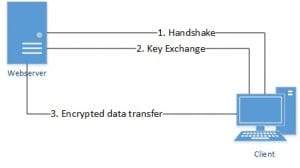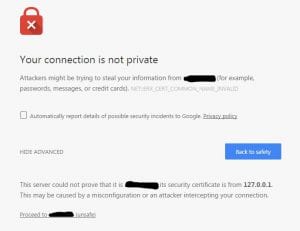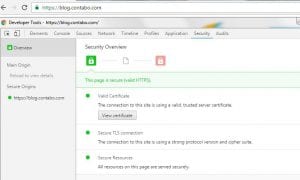Some of you might wonder in which situations an SSL certificate should be used. This tutorial will help you to find an answer whether or not you should upgrade your website or anything else by adding encryption.
The most important parts of a certificate are the public key and the private key.
The following image shows you what is happening when a client tries to establish an encrypted connection to some webserver.
First the client contacts the server and offers available encryption types, the server and the client come to an agreement on which type to use.
The web server sends the public key to the client so the client will be able to encrypt its requests. The webserver got his private key to decrypt all encrypted client requests. With the private key you are able to decrypt all client requests which were encrypted with the public key, that is why you should never hand out your private key to any third party.
To show you the advantage of using encryption, we created an HTML page containing a simple form which can be found on many websites. In the textfields we entered a username and password.
The username we chose: [email protected]
The password we entered: “unencryptedpassword”
To show the difference between encrypted messages and not encrypted messages, we captured some packets using a networking-tool.
Without any encryption we could easily extract the username and password used, we could also see which sites we visit.
With encryption enabled we could not find neither username nor password.
It just shows a packet containing some encrypted data, without the private key we cannot determine which data was actually sent.

If you are running a website, an email server or just an FTP server, it is always up to you to offer encryption or not. Offering encryption to your customers is the best way to act professionally.
There are many types of encryption, this post just handles certificates. Usually encryption algorithms have not changed for years, if you are going to optimize your server you will of course have to think about encryption types, etc.
The real meaning of those connection warnings:
If you are running a web interface (cPanel, Plesk, Webmin etc.) you probably encountered a warning as follows:
“The connection is not private”, usually you should rethink if you really want to proceed. There is the possibility that some server got hijacked and you are redirected to the wrong website. In this case the warning pops up because the certificate is not valid for the domain we entered. On a web interface you will get a similar warning when using a so called “self signed certificate”. Your browser got a list of authorities which it will trust, signed certificates by one of those authorities will not show any warning.
It can be really unwanted if that warning is showing to all of your customers, sometimes this warning is misinterpreted and the website will be left.
There is only one way to remove this warning, you need to get a certificate signed by some official authority.
Some official authorities, such as “Lets Encrypt”, will sign your certificate for free, this is a nice option but not really recommended on a production environment. Usually the domain validated certificate or wildcard certificate is being used for production environment, those certificates usually are valid for 365 days (1 year).
There are some differences between single domain, multi domain and wildcard certificates. Usually you would want a certificate for “yourdomain.tld” or “www.yourdomain.tld”. A single domain certificate will be valid only for one of those domains, a multi domain certificate alias UCC (Unified Communications Certificate) is valid for all domains included within that certificate. In case you want “www.yourdomain.tld”, “yourdomain.tld” and “subdomain.yourdomain.tld” within a single certificate, a UCC should fit your needs.
There is also some extended validation available, some bigger companies take advantage of this (e.g. PayPal 
Right after you got your certificate signed by some official authority, everyone will be able to access your encrypted website without any warning.
Important:
Encryption is important, all services (email server, FTP server, web server, etc.) running on your server should offer a way to establish an encrypted connection. There is no need of installing a signed certificate on each service, for most services self-signed certificates are fine.




